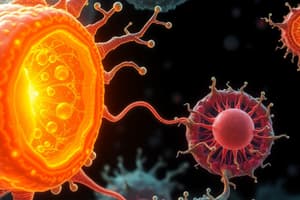Podcast
Questions and Answers
What is the primary function of cell adaptation?
What is the primary function of cell adaptation?
- To differentiate into specialized cell types
- To survive and thrive in various environments (correct)
- To respond to genetic mutations
- To undergo cellular division
Which type of adaptation involves changes in cellular function, such as altered gene expression?
Which type of adaptation involves changes in cellular function, such as altered gene expression?
- Functional Adaptation (correct)
- Environmental Adaptation
- Biochemical Adaptation
- Structural Adaptation
What is the primary mechanism of cell adaptation in response to hypoxia?
What is the primary mechanism of cell adaptation in response to hypoxia?
- Altering gene expression to adapt to low oxygen levels
- Activating ion transport mechanisms to maintain osmotic balance
- Increasing glucose metabolism and producing more ATP (correct)
- Producing heat shock proteins to maintain protein function
What is the role of epigenetic modifications in cell adaptation?
What is the role of epigenetic modifications in cell adaptation?
What is the consequence of abnormal cell adaptation?
What is the consequence of abnormal cell adaptation?
What is the role of cell adaptation in development?
What is the role of cell adaptation in development?
Which of the following is NOT a type of cell adaptation?
Which of the following is NOT a type of cell adaptation?
What is the primary mechanism of cell adaptation in response to hypertonic environments?
What is the primary mechanism of cell adaptation in response to hypertonic environments?
Flashcards are hidden until you start studying
Study Notes
Cell Adaptation
Cell adaptation refers to the ability of cells to change and adjust in response to changes in their environment. This process allows cells to survive and thrive in various conditions.
Types of Cell Adaptation
- Structural Adaptation: Changes in cell shape or size to adapt to new environments.
- Functional Adaptation: Changes in cellular function, such as altered gene expression, to respond to environmental changes.
- Biochemical Adaptation: Changes in cellular metabolism or biochemical pathways to adapt to new conditions.
Mechanisms of Cell Adaptation
- Gene Expression: Cells can alter gene expression to produce new proteins or increase/decrease existing ones to adapt to changing conditions.
- Epigenetic Modifications: Chemical modifications to DNA or histone proteins can affect gene expression and cellular adaptation.
- Cell Signaling: Cellular signaling pathways can be altered to respond to environmental cues.
Examples of Cell Adaptation
- Hypoxia: Cells adapt to low oxygen levels by increasing glucose metabolism and producing more ATP.
- Hyperthermia: Cells adapt to high temperatures by producing heat shock proteins to maintain protein function.
- Hypertonic Environment: Cells adapt to high salt concentrations by activating ion transport mechanisms to maintain osmotic balance.
Importance of Cell Adaptation
- Survival: Cell adaptation allows cells to survive in diverse environments and respond to stress.
- Development: Cell adaptation plays a crucial role in developmental processes, such as tissue morphogenesis and organ formation.
- Disease: Abnormal cell adaptation can contribute to disease development, such as cancer and metabolic disorders.
Cell Adaptation
Definition and Purpose
- Cell adaptation: the ability of cells to change and adjust in response to changes in their environment to survive and thrive.
Types of Cell Adaptation
- Structural Adaptation: Changes in cell shape or size to adapt to new environments.
- Functional Adaptation: Changes in cellular function, such as altered gene expression, to respond to environmental changes.
- Biochemical Adaptation: Changes in cellular metabolism or biochemical pathways to adapt to new conditions.
Mechanisms of Cell Adaptation
- Gene Expression: Cells can alter gene expression to produce new proteins or increase/decrease existing ones to adapt to changing conditions.
- Epigenetic Modifications: Chemical modifications to DNA or histone proteins can affect gene expression and cellular adaptation.
- Cell Signaling: Cellular signaling pathways can be altered to respond to environmental cues.
Examples of Cell Adaptation
- Hypoxia: Cells adapt to low oxygen levels by increasing glucose metabolism and producing more ATP.
- Hyperthermia: Cells adapt to high temperatures by producing heat shock proteins to maintain protein function.
- Hypertonic Environment: Cells adapt to high salt concentrations by activating ion transport mechanisms to maintain osmotic balance.
Importance of Cell Adaptation
- Survival: Cell adaptation allows cells to survive in diverse environments and respond to stress.
- Development: Cell adaptation plays a crucial role in developmental processes, such as tissue morphogenesis and organ formation.
- Disease: Abnormal cell adaptation can contribute to disease development, such as cancer and metabolic disorders.
Studying That Suits You
Use AI to generate personalized quizzes and flashcards to suit your learning preferences.




